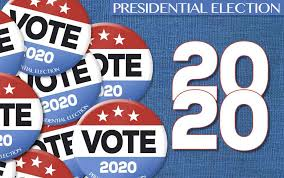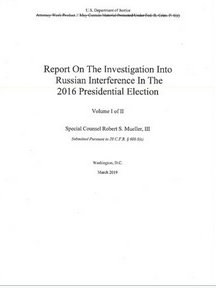We have thoughts on how each Democratic presidential candidate can improve his or her campaign. In the weeks ahead, we’ll share those. For now, we’ll start with things that apply generally.
The race for the 2020 Democratic presidential nomination remains in its early stages (the first voting in Iowa occurs February 3), but has taken shape such that we can say the  nominee will probably come from a group of four candidates. Joe Biden, Bernie Sanders, Elizabeth Warren, or Kamala Harris seemingly have the best chance at standing on the stage as the nominee next July at the Democratic Convention in Milwaukee. We can make a case a few others – Pete Buttigieg, Julian Castro, Michael Bennett, Amy Klobuchar, Beto O’Rourke, Cory Booker -- might get there but, to varying degrees, they’re long shots. Unless something shakes up the race, that’s where we are.
nominee will probably come from a group of four candidates. Joe Biden, Bernie Sanders, Elizabeth Warren, or Kamala Harris seemingly have the best chance at standing on the stage as the nominee next July at the Democratic Convention in Milwaukee. We can make a case a few others – Pete Buttigieg, Julian Castro, Michael Bennett, Amy Klobuchar, Beto O’Rourke, Cory Booker -- might get there but, to varying degrees, they’re long shots. Unless something shakes up the race, that’s where we are.
 nominee will probably come from a group of four candidates. Joe Biden, Bernie Sanders, Elizabeth Warren, or Kamala Harris seemingly have the best chance at standing on the stage as the nominee next July at the Democratic Convention in Milwaukee. We can make a case a few others – Pete Buttigieg, Julian Castro, Michael Bennett, Amy Klobuchar, Beto O’Rourke, Cory Booker -- might get there but, to varying degrees, they’re long shots. Unless something shakes up the race, that’s where we are.
nominee will probably come from a group of four candidates. Joe Biden, Bernie Sanders, Elizabeth Warren, or Kamala Harris seemingly have the best chance at standing on the stage as the nominee next July at the Democratic Convention in Milwaukee. We can make a case a few others – Pete Buttigieg, Julian Castro, Michael Bennett, Amy Klobuchar, Beto O’Rourke, Cory Booker -- might get there but, to varying degrees, they’re long shots. Unless something shakes up the race, that’s where we are.
So, how do these candidates make the nomination worth having? How, as a group, do they give whoever emerges as the nominee the best opportunity for taking down Donald Trump? We have some suggestions.
Collective Advice
The second debate held last month in Detroit
Quit attacking President Obama Trump said the next day Obama got attacked more than he did. That wasn’t literally true, but we take his point. In going after Biden, several candidates challenged Obama’s immigration policies, pointedly asking Biden if, as Vice President, he counseled Obama against what he did on deportations. Biden, properly, wouldn’t say how he privately advised Obama. The 44th President wasn’t perfect and he no doubt made decisions he’d prefer having back. But he has a 95 percent approval rating among Democrats. Whoever gets nominated will need his help in the 2020 fall campaign. Nothing good can come from running him down.
Demonstrate some flexibility Democrats get  it that voters, as they showed in the 2018 midterms, care about health care. The health care discussion in the debate, however, served Republican ends, not Democratic ones. First, some candidates behaved with a “my way or the highway” attitude about their health care plans. These candidates argued there’s only one way on health care and it’s theirs. Second, other candidates offered health care plans so
it that voters, as they showed in the 2018 midterms, care about health care. The health care discussion in the debate, however, served Republican ends, not Democratic ones. First, some candidates behaved with a “my way or the highway” attitude about their health care plans. These candidates argued there’s only one way on health care and it’s theirs. Second, other candidates offered health care plans so
 it that voters, as they showed in the 2018 midterms, care about health care. The health care discussion in the debate, however, served Republican ends, not Democratic ones. First, some candidates behaved with a “my way or the highway” attitude about their health care plans. These candidates argued there’s only one way on health care and it’s theirs. Second, other candidates offered health care plans so
it that voters, as they showed in the 2018 midterms, care about health care. The health care discussion in the debate, however, served Republican ends, not Democratic ones. First, some candidates behaved with a “my way or the highway” attitude about their health care plans. These candidates argued there’s only one way on health care and it’s theirs. Second, other candidates offered health care plans so
complex no voter who has a life can figure them out. Democrats should set out principles and goals everybody wants – universal coverage, protection of coverage for pre-existing conditions, lower drug costs – and commit to working with other Democrats and enlightened Republicans on finding a plan that accomplishes them.
Don’t fight with each other The July debate  in Detroit didn’t get overly personal, but we can see that happening soon if the candidates don’t commit to making this more about Trump than about each other. We wonder, for example, if the relationship between Harris and Biden isn’t already
in Detroit didn’t get overly personal, but we can see that happening soon if the candidates don’t commit to making this more about Trump than about each other. We wonder, for example, if the relationship between Harris and Biden isn’t already
fractured beyond repair. Whoever’s left for the September debate in Houston should base their complaints about any of their fellow Democrats on policy and make clear they’ll do everything possible for whoever wins the nomination. After all, any of them would make a much better president than the one we have now.
 in Detroit didn’t get overly personal, but we can see that happening soon if the candidates don’t commit to making this more about Trump than about each other. We wonder, for example, if the relationship between Harris and Biden isn’t already
in Detroit didn’t get overly personal, but we can see that happening soon if the candidates don’t commit to making this more about Trump than about each other. We wonder, for example, if the relationship between Harris and Biden isn’t already |
| Biden & Feud at 2nd Debate |
That brings us to what they should say about Trump and why America must rid itself of him.
Please Make It About Trump
Race Baiting Millions of words have been written about Trump’s promotion of racial division and discord, so we’ll add only a few. We have no difficulty believing his hate-filled diatribes against Hispanic immigrants fostered the climate that allowed the
mass shooting in El Paso. His attacks on four female members of congress, all women or color, are disgusting, as was his broadside at black Maryland Representative Elijah Cummings. Democrats, by calling him out, loudly and constantly, can drive minority group turnout and attract moderate white voters, especially women, in the suburbs.
Rule of Law Whether the House impeaches Trump or not, his flagrant disregard for the rule of law merits removing him from office. The Mueller Report provides all the evidence needed for making the case he should go. Many of the Democratic candidates claim they’ve read it. It’s time they started showing their work.
Ghastly trade policy Trump’s tariffs may hurt China, but they’re damaging American farmers as much or more. Retailers will feel the effects soon, as will consumers. The policy is becoming one giant self-inflicted wound.
Federal government in disarray Every week it seems another cabinet level officer leaves. Director of National Intelligence Dan Coates, a respected former U.S. Senator from Indiana and one of the few grownups left in the Administration, announced on July 29 his resignation, effective August 15. Trump then said he’d replace Coates with grossly unqualified Texas Congressman John Ratcliffe. He withdrew after a week when even Republican support didn’t materialize. Then there are all the other agencies operating with acting heads.
We could name plenty of other things wrong with the Trump presidency. Piling on isn’t necessary for making the point it should end as quickly as possible. The sins named merely start the list and the Democratic candidates should lead the way in pointing them out.
























